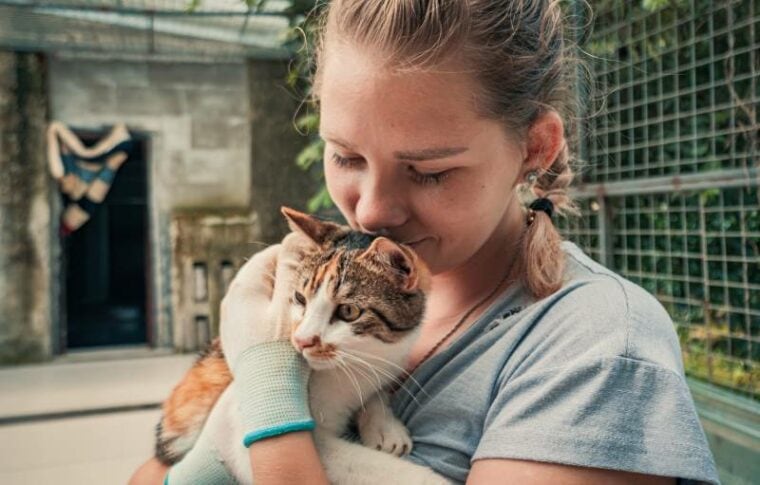
Animal rescue organizations, adoption centers, and shelters deserve all the praise in the world. People who work there dedicate their lives to helping strays in need. And that’s exactly why the National Animal Shelter Appreciation Week was created: to recognize their efforts. The celebration always falls on the first full week of November.
What exactly happens during this event, though? What can we, regular pet parents, do to help the cause? We have all the answers right here!
The US Animal Shelter Appreciation Week: What Does It Celebrate?
Just like the name suggests, NASA Week has one simple yet important role, which is to recognize the selfless, devoted staff members at animal shelters. They come to the aid of displaced cats, dogs, and other beasts, giving them food, a roof over their heads, comfort, and medical attention. Without these shelters, life would’ve been much harder for the strays.
There are literally millions of homeless, injured, abused, and sick four-legged buds out there in desperate need of help. And then we have lost pets longing to get back home, as well as rescues hoping to find a new family. Animal shelter workers don’t get nearly enough appreciation in their day-to-day lives, but the National Animal Shelter Appreciation Week does its fair share to fix that.

What Can Pet Owners Do to Help on NASA Week?
The most obvious thing would be to adopt a dog or a cat. Not ready to become a pet parent just yet? Consider donating to a local animal shelter. It doesn’t have to be a huge sum: for animal shelters, every single dollar counts. Or it can be some toys, clothes, food, or meds. Spreading awareness and getting other folks to help will also be greatly appreciated.
Most people are more than happy to donate $5–10 for the right cause. We’re talking about friends, distant relatives, or people that you’re talking to online. Post a memo about the National Animal Shelter Appreciation Week on your social media to get pet fans from all walks of life involved. Lastly, tell them about the pros of sterilization and using ID tags.
National Animal Shelter Appreciation Week Origins
It all started back in 1824 when the RSPCA was founded in the UK; ASPCA, the US branch, was established in 1866. It was the first organization in the country to focus on animal welfare. But, at first, ASPCA wasn’t doing anything for canines or felines, only horses. The first shelter in the States opened its doors in 1869. Five years later (in 1874), Pennsylvania founded its own animal welfare society, PSCA.
Its mission was to protect shelter animals from abuse, cruelty, and neglect. This is important: before the 1970s, euthanasia was the only option for most strays. And to this day, there aren’t any set-in-stone rules and regulations regarding animals in shelters. But thanks to technological progress, modern-day shelters offer preventative care, various treatments, and more.

So, When Did This Week Come Into Effect?
The Humane Society introduced the National Animal Shelter Appreciation Week to the United States back in 1996, and it’s been celebrated ever since. In the 90s, shelters, rescue organizations, and adoption centers weren’t nearly as advanced as they are today. And unfortunately, most people don’t realize how much time, effort, and financial investment animal care takes.
That’s why it was decided to dedicate a week to the altruistic men and women who volunteer at animal shelters. They take care of strays, find new homes for them, and help lost pups/kitties reunite with their owners. Some centers also provide cheap medical care. As of 2022, there are more than 3,500 animal shelters in America. If there is one in your neighborhood, make sure to give them the thumbs up.
Animal Shelters in the United States: Latest Statistics
There are approximately 70 million stray dogs and cats roaming the streets of the US. Each year, shelters take in less than 10% (around 6.3 million homeless animals, 3.1 dogs and 3.2 million cats). At the same time, they have to euthanize close to one million animals. Compared to official statistics from 2011 with 2.6 million euthanized strays, that’s a significant improvement (although still a disturbing reality).
This was made possible thanks to a larger number of shelters and rescue centers. Also, today, a substantial number of lost pets are reunited with their human families (more than 710,000 dogs and 100,000 cats). And what about rescues that get a lucky ticket and meet their new owners? On average, up to four million animals harbored by shelters are adopted by pet parents.

Are Animal Shelters Funded by the Government?
Most shelters in the United States rely heavily on donations to house, feed, and treat strays. True, a small percentage of animal welfare organizations are, indeed, run by local governments and receive funding from the state or the city. But mainly, it’s the small annual donations, crowdfunding, and fundraisers/charities that keep them afloat, not the municipal budget.
The most fortunate shelters even receive grants from HSUS, ASPCA, and other organizations. The same is true for rescue and adoption centers, by the way. They’re non-profit, non-commercial establishments that are often operated by a very small group of people. So, the adoption fees are barely enough to keep things running.
Why Do Shelters Euthanize Animals?
Sadly, it all comes down to a lack of proper funding. Animals aren’t cheap to take care of, yet shelters are always strapped for cash. So, if it’s a sick dog or cat that needs expensive meds, but the shelter is overcrowded, most likely, that animal will be euthanized. It might be unethical to put a living creature to eternal rest without asking its permission, but, again, shelters simply don’t have enough resources for all the strays.
Right now, most states require shelters/adoption centers to sterilize homeless animals, but that doesn’t seem to be solving the problem. And one more thing: a lot of domestic animals get lost and are never found. Thankfully, with ID tags, microchips, trackers, and local or federal licenses, it shouldn’t be hard to reunite with your four-legged buddy.
Conclusion
We love our pets and do everything in our power to make them feel loved and cherished. Unfortunately, not every animal on the planet gets that same treatment. There are countless stray cats and dogs in the United States, and, if not for the wonderful people that run and work at animal shelters, those numbers would’ve been much higher.
So, if you’d like to show support for the cause, the best time to do that would be early November, during the National Animal Shelter Appreciation Week. Spread awareness, volunteer at a local shelter/rescue center, and take good care of your own pet. Donations will be greatly appreciated as well. Even a single buck can make a difference!
Featured Image Credit: Evgeny Bakhchev, Shutterstock








